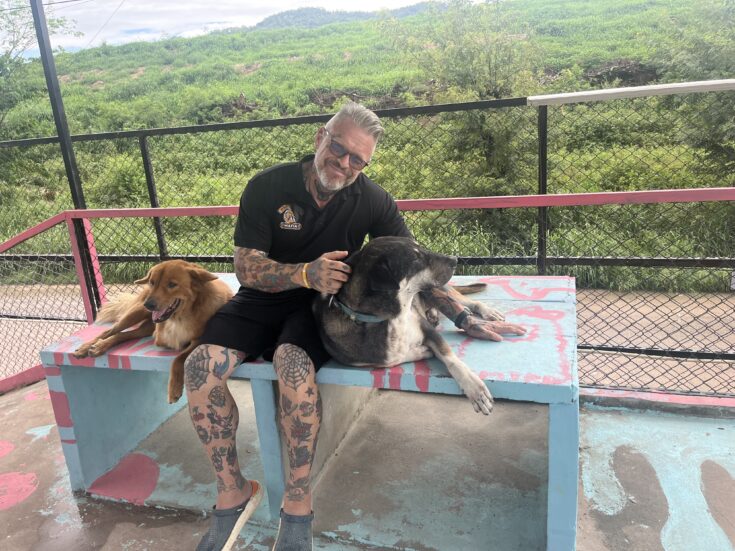
As you drive down the relatively deserted road in Chonburi, with a series of lakes, green fields and mountains in the background, you think that this idyllic place will be completely silent. However, you don’t have to go far down the road before you notice that it is not like any ordinary, rather deserted nature road. Along the path, there is a long row of fenced kennels, where a multitude of street dogs run around on the other side of the wire. Partly curious and partly unsure, many of them run barking towards the fence as a stranger is trespassing on their otherwise remote territory.
”It’s not always like this. It’s only when strangers come by that they bark like this,” tells Michael J. Baines.
The Man That Rescues Dogs
Michael is originally Swedish. He moved to Thailand 21 years ago while working as a chef. But after rescuing his first street dog, his passion for saving strays has become a fulltime occupation.
“It started back in 2011. I worked at this restaurant called Buffalo Bill Steakhouse. One day there was a dog that showed up behind the restaurant. She was in really bad shape. So, I started to feed her and she would come back every day. I fed her for a week and gained her trust before taking her to the clinic. She was at the clinic for 10 days, but she was fine after that,” he shares.
In 2012 he decided to quit his job and move back to Bang Saen. Here, he started his own restaurant with only 30 seats. Just him and 2 waitresses.
“Then I started feeding the stray dogs from my house to the restaurant. In 2016, I decided to rent a house, hire staff and take in more dogs. Because I had no place to keep my dogs by then,” Michael explains about the process. A process that has been covered by several international media and gone viral several times.
Michael is today working around 16 hours a day caring for the many dogs at the shelter, that is home for 750 dogs. Besides that, the organization feed another 400 dogs daily, that is still living on the streets in the area. A comprehensive cooperation with 44 employees, that goes by the name “The Man That Rescues Dogs.”
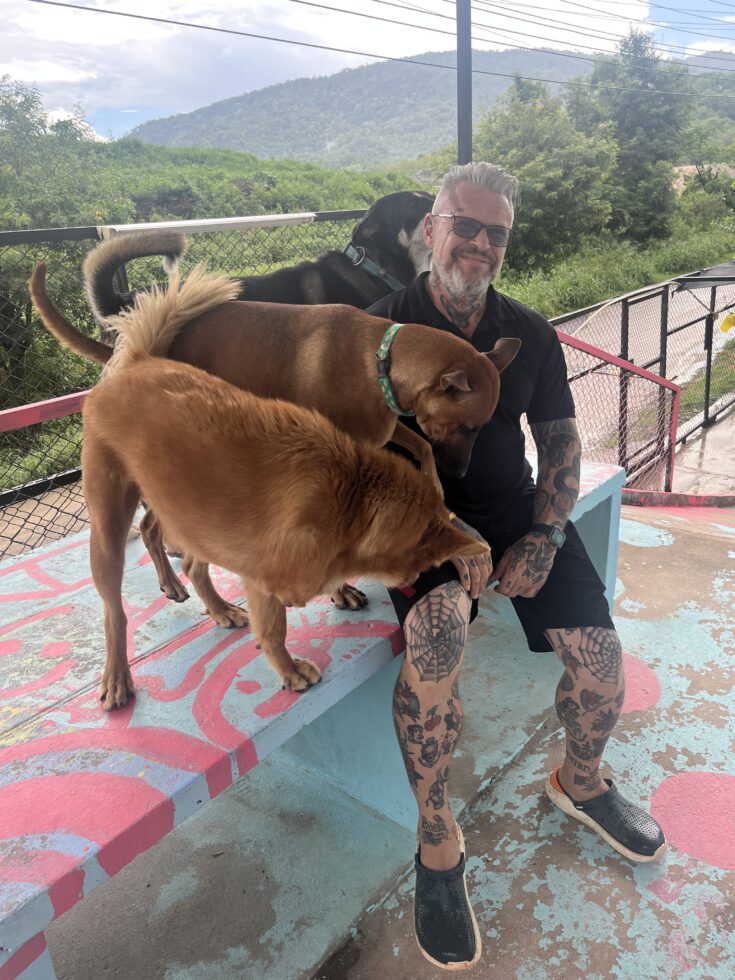
1.6 million per month
“It costs a lot to care for this many dogs. We spend around 1.6 million THB per month and we solely rely on charity. So, we have to do a lot of marketing as well, to be able to collect that kind of money,” Michael explains.
As he is telling me about the many dog-related task the staff have to keep up on a daily basis, a group of dogs out on their first walk of the day, is coming towards us. Michael starts calling out for one of the dogs, that due to the stranger at the scene, seems a little reluctant to go near. Instead, another less fearful dog runs towards us. It quickly nips my butt before jumping up to lick my face. It is hard not to melt by the trust and affection, even though the handsome boy smells like he hasn’t had a shower for months, while his breath is even worse.
“What’s his name?” I ask. But Michael has to admit, that he doesn’t remember all 750 names. A fact you wouldn’t have known if he hadn’t admitted it. As he walks down the road, he greets several dogs behind the fence. All of them by name and with a genuine warm and caring attitude.
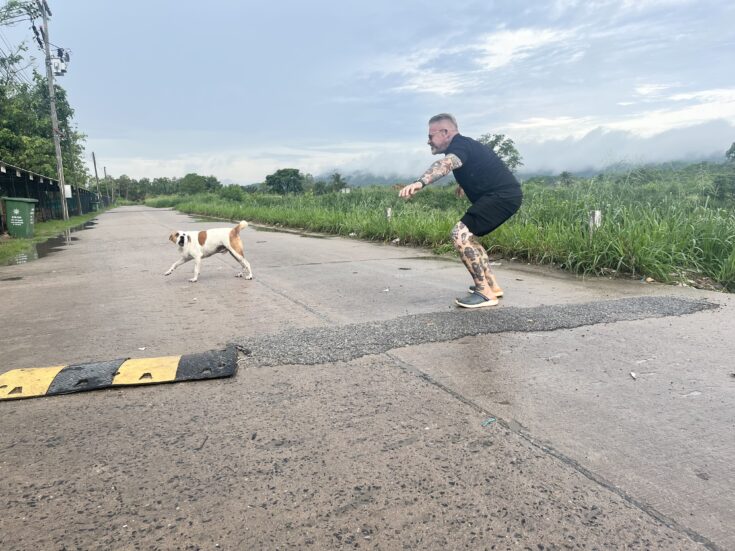
Taking in disabled strays
But it isn’t just healthy and moveable dogs that the shelter cares for. The place has its own animal hospital along with a whole section for disabled dogs.
As Michael shows the way toward the animal hospital, we pass two siblings who was brought in by the authorities after their owner had brutally been beating them daily.
“They were in such a horrible state when they came here. They were beaten up every day by an old man. He chained them up and broke their teeth. The neighbors contacted us and we had them brought here by the authorities,” Michael shares while he points towards two beautiful, happy looking, cream-colored dogs. Moving lively around in the small space they have by themselves in the quarantine area. Here, they are kept until they have had all the necessary vaccines to be released to the shelter with the rest of the dogs.
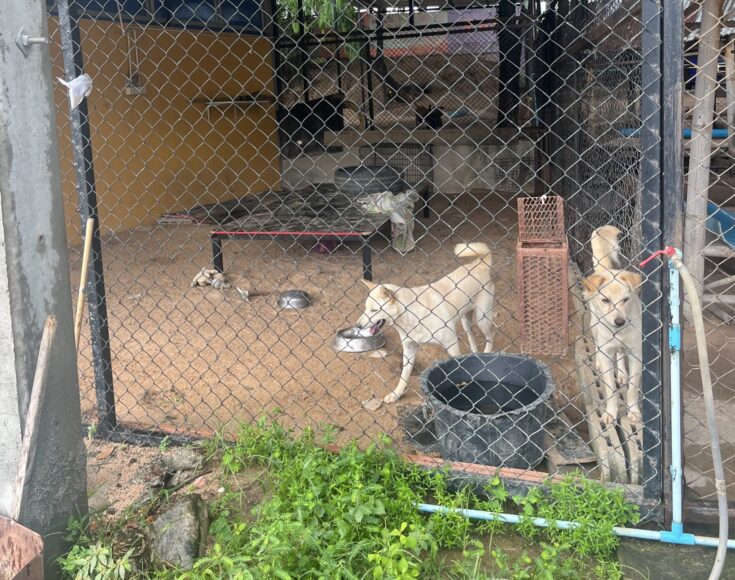
Having their own hospital unit
Coke, one of Michaels own dogs was diagnosed with Pancreatitis back in November. A chronic disease that makes him loose appetite. This has resulted in him loosing 13 kilos since December. Because of that, he is one of the residents at the dog shelter’s private hospital section during the daytime.
“He’s down to 11 kilos now. It looks like we have finally found something he seems to be eating, so I really hope this will help. He ate yesterday, so that makes me happy,” Michael shares.
Michael himself has 16 dogs at the moment. At most he takes in 18, but in the last two years he has lost six dogs, bringing him down to 16 dogs at the moment.
When he took in Coke 10 years ago, his Swedish neighbors would pass by his garden and call him an animal abuser for keeping the dog alive.
“So, I sent an email to 10 veterinarians that work for the provincial veterinarians in Sweden and asked them if it was animal abuse. Five of them said, that according to the Swedish law, I should put the dog to sleep, because in Sweden they don’t think that the dog is having a good enough dog life in that state. Then five of them said, that if the dog is not suffering, and I was willing to take care of him, then it was up to me. But maybe that’s why people from especially Sweden, or maybe in Scandinavia in general, are not used to this.”
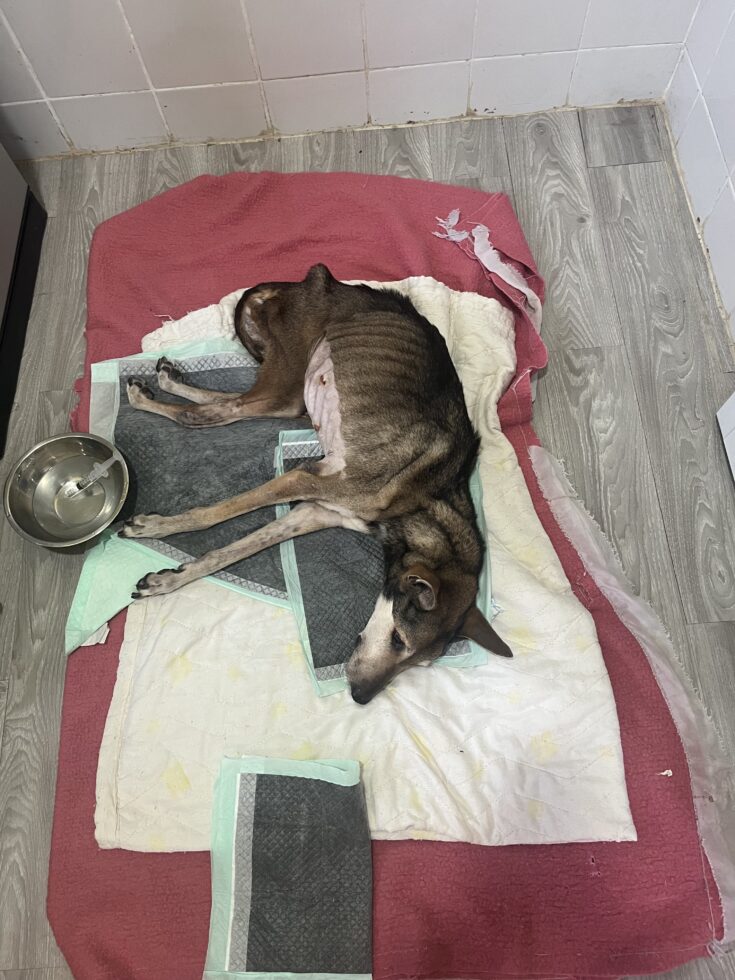
Your profession before your beliefs
Due to Thailand being a Buddhist nation, it is against their faith to kill animals. Therefore, many veterinarians in Thailand do not practice euthanasia because they believe in karma. This means that if they end the life of an animal, they will get bad luck in the future. Even if the animal was in pain. Another reason why, Michael’s work with the dogs is essential.
“Our dogs here are not in pain. If a dog is in pain, we will not keep it alive just to keep it alive. If the dog is in constant pain, then we put it to sleep. It is possible. More young veterinarians are coming out to the work field now and many of them accept it. But it’s not an easy decision,” Michael shares and tells me about Steve.
Steve is lying on the floor in front of the entrance to the hospital as we enter. Next to him sits one of the staff members who is trying to feed him, but without much luck.
“We rescued Steve around here recently. He had an inflammation (distemper) which had already entered the central nervous system (CNS). He can’t do anything but lie down. He gets IV fluids now, cause he doesn’t want to eat. We have all agreed to give it three more days. If there is still no improvement, we will have to put him down, because that’s not a life,” Michael says while trying to seem unaffected, but there is a hint of sentimentality in his voice, as he utters the words.
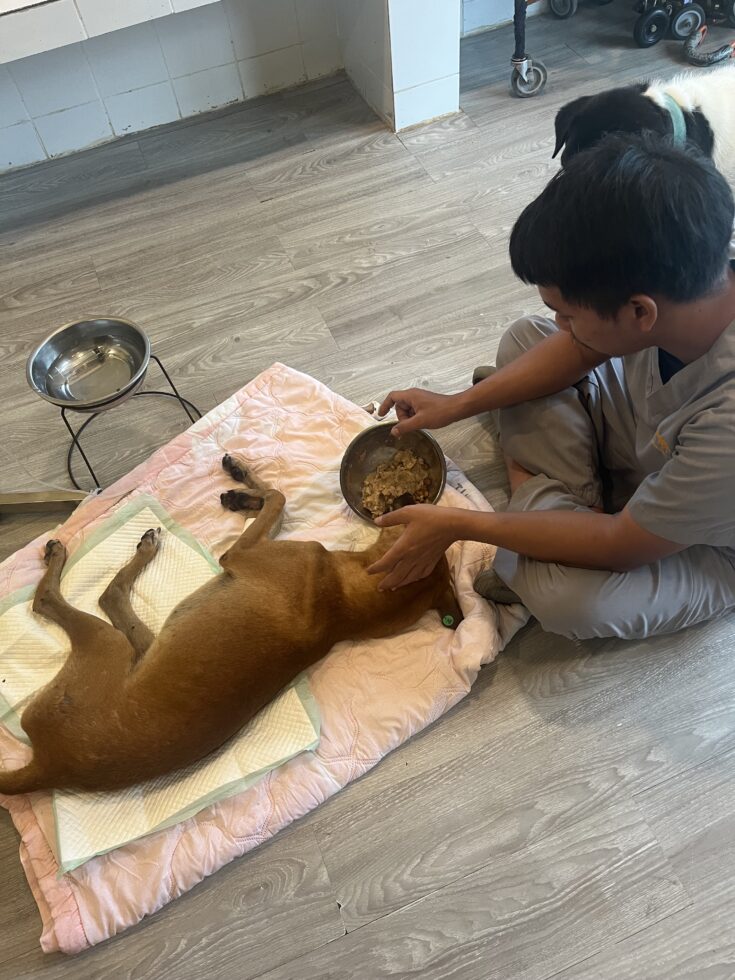
The ones he calls his own
A question Michael is still asking himself in connection to his own dog Coke.
“If he’s not eating enough and losing weight constantly every week. Then, what’s the point? But I don’t want him…” Michael pauses. “I don’t want to put him to sleep. But if he’s suffering.” Once again, he has to take I small pause to collect himself. “To see my boy, going from 24 kilos to 11 kilos. My big boy.”
Even though Michael truly cares for all of the dogs at the shelter, it is clear that he has a special connection to the ones he calls his own. Still, he can’t really explain why those exact dogs end up living with him and not among the remaining 750 dogs at the dog pound.
“Well, I’d say the first 10 was probably because I didn’t have any space when I rescued them from the streets. So, they had to live with me. The last one I took in, Marshall, she’s about 7-8 months old now. We rescued her and her mom, but her mom had to have an emergency surgery. Unfortunately, she didn’t make it, which left Marshall alone, so, I had to take care of her,” Michael says after just having said, that every time one of his dogs passes away, he swears that he won’t be taking in more new dogs as his own.
“So yeah, sure. I did that. I do that,” he then exclaims.
In need of a break
And though Michael clearly loves his dogs, he still needs a break from it all once in a while. He therefore works nine days straight, and then goes to Bangkok to relax for a couple of days.
“Even though I love dogs, sometimes they get on my nerves. Because most of them get along, but some don’t. I have two sisters, Cafe and Love. They hate each other. It’s okay, I manage to control them most of the time. They fight maybe once every three months. But that’s a killer fight. So, for me to function, I need to get away,” Michael explains.
And it is not just sibling-fights that can get on Michaels nerves. Four years back, he took in his dog Itto, who starts howling every morning around 3-4 a.m.
“Every day about 3 or 4 a.m., he starts to howl and he get all my other dogs to howl as well.
So, I have this personal symphony for about one and a half to two minutes every morning. I do have earplugs, but it is just so loud,” he says with an indulgent smile.
Having to care for 1,150 dogs may seem like an easy task, but it is a rather stressful obligation.
“I have a bleeding ulcer. Last Sunday, I woke up in the middle of the night cold sweating. I’ve had it two times before. First time was 13 years ago. Back then I had a blood transfusion. I lost so much blood. The second one was two years ago and now it has happened again. Most of it is stress related,” he shares, while crediting his staff, for giving him certainty, that someone is always there to care for the many dogs, when he himself can’t.
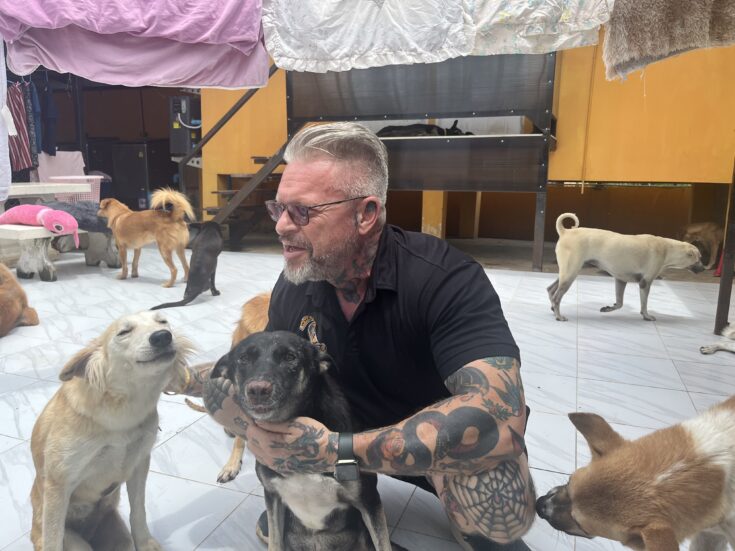
The wheelchair Mafia
“So, this is the care unit,” he says as we enter the special unit.
Even though the area is big, it seems rather crowded, since most of the dogs’ cluster together in the front. Four staff members walk around the many dogs, trying to take care of their special needs, but even so, the care unit is quickly characterized by a rather distinct smell, that does not apply for the rest of the dog pound. On the white tiles, you see traces of feces from the many dogs, that drags their bums across the floor. But still, none of the employees, nor Michael, seems to be bothered by the smell, as the staff are constantly cleaning the floors and doing the laundry. Trying to keep the place as clean for the dogs as possible.
“We have about 100 dogs here with special needs. We have 44 dogs with a wheelchair. We have the blind dogs here. The senior dogs and some dogs that have CNS. They all need special care,” he says while kneeling to greet the many dogs, that makes their way to meet him.
The unit consist of a large playroom and a sleeping area where their beds are laid out at night. Lined up towards the fence is all of the special made wheelchairs for the 44 paralyzed dogs, who can still run when being strapped to their wheels. The Wheelchair Mafia as Michael calls them.
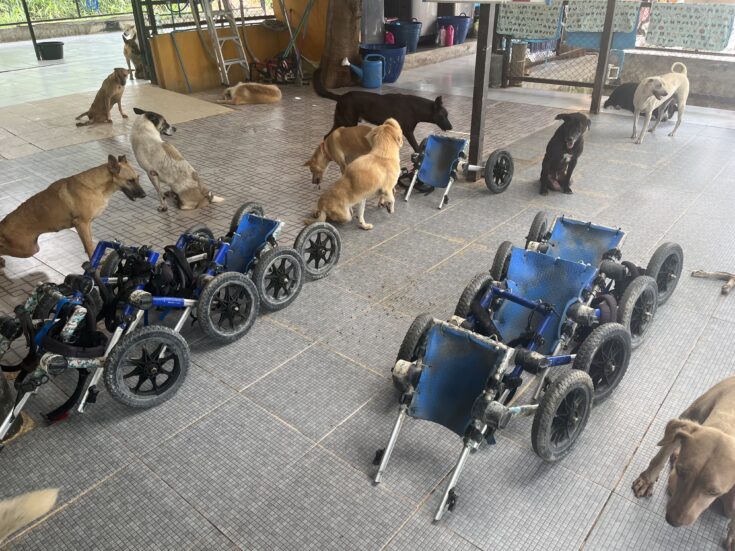
Not all car accidents
One of the paralyzed dogs is NaamDaeng.
“This group of teenagers shot her with a BB gun. Seven bullets. Five in the neck and two in the spine. She could still walk at first, but then the next day, the bullet penetrated her and she has been paralyzed ever since,” Michael shares about this beautiful, sweet-tempered dog, with a slightly sad expression in her otherwise soft eyes.
In the corner of the sleeping area, is the mattresses stacked on shelves during the day. All in different colors, shapes and patterns.
“When we put out the mattresses the place looks like a dog hostel. We put out 12 mattresses, and they sleep maybe two or three dogs per mattress,” Michael explains, while lending a paralyzed dog a hand, by pushing him up from a crack in the cemented floor, where his bum had gotten stuck.
The staff starts to line up the wheelchairs. Then one by one, they are getting strapped to their wheels and ready for their walk.
As they are all set, the gates are opened, and the many dogs come running out of the unit. All with the biggest smiles on their sweet and innocent faces. The same goes for Michael who lights up, as the dogs come running out.
Always a fundraiser going on
“There’s always a fundraising going on. We need 55,000 baht every day to run the operation. That is why I need to find donors from around the world. We don’t have any big companies to back us. I wish we had a few, but we don’t. So, my most important job is to make sure that we have the finances to run this operation.”
The Man That Rescues Dogs spay and neuter dogs on a daily basis in the effort to prevent more strays on the streets. The 750 dogs they have at the shelter is all up for adoption, but only for the right home.
For more information go to: The Man That Rescues Dogs


